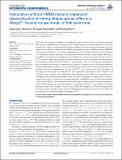Habituation without NMDA Receptor-Dependent Desensitization of Hering- Apnea Reflex in a Mecp2 [superscript + / -] Mutant Mouse Model of Rett Syndrome
Author(s)
Song, Gang; Tin, Chung; Giacometti, Emanuela; Poon, Chi-Sang
DownloadSong-2011-Habituation without NMDA.pdf (1.884Mb)
PUBLISHER_POLICY
Publisher Policy
Article is made available in accordance with the publisher's policy and may be subject to US copyright law. Please refer to the publisher's site for terms of use.
Terms of use
Metadata
Show full item recordAbstract
Non-associative learning is a basic neuroadaptive behavior exhibited in almost all animal species and sensory modalities but its functions and mechanisms in the mammalian brain are poorly understood. Previous studies have identified two distinct forms of non-associative learning in the classic Hering–Breuer inflation reflex (HBIR) induced apnea in rats: NMDA receptor (NMDAR)-independent habituation in a primary vagal pathway and NMDAR-dependent desensitization in a secondary pontine pathway. Here, we show that abnormal non-associative learning of the HBIR may underlie the endophenotypic tachypnea in an animal model of Rett syndrome (RTT), an autism-spectrum disorder caused by mutations in the X-linked gene encoding methyl-CpG-binding protein 2 (MECP2). Mecp2+/− [Mecp2 superscript + / -] symptomatic mice on a mixed-strain background demonstrated significantly increased resting respiratory frequency with shortened expiration and normal inspiratory duration compared with asymptomatic mutants and wild-type controls, a phenotype that is characteristic of girls with RTT. Low-intensity electrical stimulation of the vagus nerve elicited fictive HBIR with time-dependent habituation in both Mecp2+/− [Mecp2 superscript + / -] and wild-type mice. However, time-dependent desensitization of the HBIR was evidenced only in wild-type controls and asymptomatic mutant mice but was absent or suppressed in Mecp2+/− [Mecp2 superscript + / -] symptomatic mice or in wild-type mice after blockade of NMDAR with dizocilpine. Remarkably, ∼50% of the Mecp2+/− [Mecp2 superscript + / -] mice developed these X-linked phenotypes despite somatic mosaicism. Such RTT-like respiratory endophenotypes in mixed-strain Mecp2+/− [Mecp2 superscript + / -] mice differed from those previously reported in Mecp2-/y [Mecp2 superscript - / y] mice on pure C57BL/6J background. These findings provide the first evidence indicating that impaired NMDAR-dependent desensitization of the HBIR may contribute to the endophenotypic tachypnea in RTT.
Date issued
2011-05Department
Harvard University--MIT Division of Health Sciences and Technology; Massachusetts Institute of Technology. Department of Biology; Whitehead Institute for Biomedical ResearchJournal
Frontiers in Integrative Neuroscience
Publisher
Frontiers Research Foundation
Citation
Song, Gang et al. “Habituation without NMDA Receptor-Dependent Desensitization of Hering–Breuer Apnea Reflex in a Mecp2+/− Mutant Mouse Model of Rett Syndrome.” Frontiers in Integrative Neuroscience 5:6 (2011): n. pag. © 2011 Song, Tin, Giacometti and Poon
Version: Final published version
ISSN
1662-5145